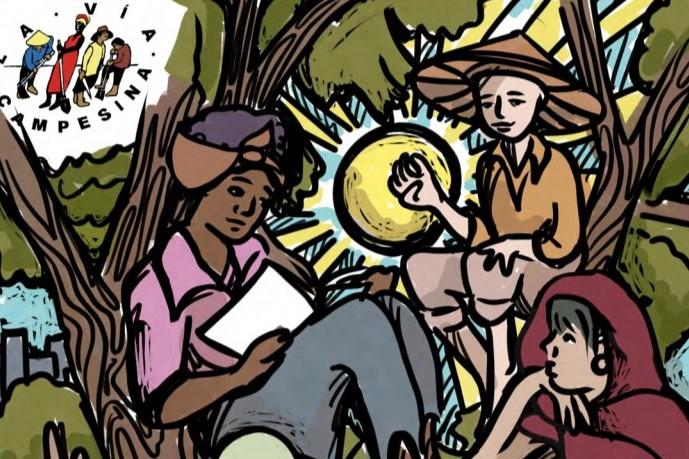
The United Nations Declaration on the Rights of Peasants and Other People Working in Rural Areas (UNDROP)
The United Nations Declaration on the Rights of Peasants and Other People Working in Rural Areas (UNDROP) has a comprehensive scope and comprises many more rights than those related to seed and genetic resources. Also, the rights related to seed and genetic resourse are much more far reaching than those provided on Farmers’ Rights in the Plant Treaty. As a declaration, however, this is not a legally binding instrument, and even if the majority of countries supported the declaration, many countries have not. Nevertheless, UNDROP establishes important international norms shared by the majority of states, which may also affect the implementation of Farmers’ Rights under the Plant Treaty.
The United Nations Declaration on the Rights of Peasants and Other People Working in Rural Areas (UNDROP) was adopted by the General Assembly of the United Nations at its Seventy-third Session (Agenda Item 74b) in December 2018, with 121 votes in favor, 8 countries against and 54 countries abstaining from voting. As a declaration, it is not a legally binding agreement, like the other agreements presented here, but it establishes important international norms shared by the majority of states.
UNDROP provides that states shall respect, protect and fulfil the rights of peasants and other people working in rural areas and take legislative, administrative and other steps towards this end. The scope of the rights is comprehensive. UNDROP covers rights of peasants and other people working in rural areas related to:
- equality and non-discrimination, including against women
- natural resources and development
- life, liberty, and security of person
- freedom of movement
- freedom of thought, opinion, and expression
- freedom of association
- participation in decision-making
- information
- access to justice
- work
- safe and healthy work environment
- food and food sovereignty
- decent income and livelihood and the means of production
- land
- clean, safe, and healthy environment
- seeds
- biological diversity
- clean water systems
- social security
- physical and mental health
- housing
- education and training
- culture and traditional knowledge
The most relevant provision for Farmers’ Rights related to plant genetic resources for food and agriculture, is Article 19, which provides that peasants and other people working in rural areas have the right to seeds; to the protection of traditional knowledge relevant to plant genetic resources for food and agriculture; to equitably participate in sharing the benefits arising from the utilization of plant genetic resources for food and agriculture; to participate in the making of decisions on matters relating to the conservation and sustainable use of plant genetic resources for food and agriculture; and the right to save, use, exchange and sell their farm-saved seed or propagating material.
Furthermore, Article 19 provides that peasants and other people working in rural areas have the right to maintain, control, protect and develop their own seeds and traditional knowledge. It also provides that states shall take measures to respect, protect and fulfil the right to seeds of peasants and other people working in rural areas; that seeds of sufficient quality and quantity are available to peasants at the most suitable time for planting and at an affordable price; and to recognize the rights of peasants to rely either on their own seeds or on other locally available seeds of their choice and to decide on the crops and species that they wish to grow.
Towards these ends, states shall take appropriate measures to support peasant seed systems and promote the use of peasant seeds and agrobiodiversity, as well as to ensure that agricultural research and development integrates the needs of peasants and other people working in rural areas and ensure their active participation in the definition of priorities and the undertaking of research and development, taking into account their experience, and increase investment in research and the development of orphan crops and seeds that respond to the needs of peasants and other people working in rural areas.
Finally, Article 19 provides that states shall ensure that seed policies, plant variety protection and other intellectual property laws, certification schemes and seed marketing laws respect and take into account the rights, needs and realities of peasants and other people working in rural areas. Thus, UNDROP echoes the Plant Treaty but goes much further in defining Farmers’ Rights. The major challenges are that more than 60 countries are not supportive and that this is not a legally binding international instrument. Nevertheless, UNDROP provides an important platform for working to establish international norms and practices relating to Farmers’ Rights and may affect the implementation of Farmers’ Rights under the Plant Treaty.
At its Eight Session, the Governing Body of the Plant Treaty took note of UNDROP (Resolution 6/2019, para 24). At its Ninth Session, the Governing Body requested the Secretary to continue to disseminate and promote the use of the Educational Module on Farmers’ Rights, and to update it as necessary, including information on new developments of relevant international human rights instruments and declarations (such as UNDROP), and to translate it into the United Nations official languages, subject to the availability of financial resources, and invites Contracting Parties and other relevant stakeholders to use it (Resolution 7/2022, para 9).
Text: Regine Andersen